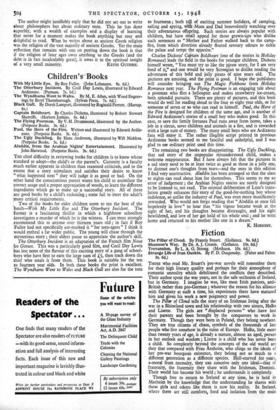Children's Books
With My Little Eye. By Roy Fuller. (John Lehmann. 8s. 6d.) The Otterbury Incident. By Cecil Day Lewis, illustrated by Edward Ardizzone. (Putnam. 7s. 6d.) Black Gull. By Derek Lamport, illustrated by Reginald Perrott. (Harrap. 6s.)
Paul, the Hero of the Fire. Written and illustrated by Edward Ardiz- zone. (Porpoise Books. 3s. 6d.) THE chief difficulty in reviewing books for children is to know whose standard to adopt—the child's or the parent's. Curiosity is a faculty _much earlier apparent in children than reasoned criticism, and to the extent that a story stimulates and satisfies their desire to know " what happened next " they will judge it as good or bad. On the other hand the conscientious parent wants his child to assimilate the correct usage and a proper appreciation of words, to learn the different ingredients which go to make up a successful story. All of these are good books by a child's reckoning ; some fail to meet the adult's more critical requirements.
Two of the books for older children seem to me the best of the batch—With My Little Eye and The Otterbury Incident. The former is a fascinating thriller in which a highbrow schoolboy investigates a murder of which he is the witness. I can most strongly recommend this to anyone over thirteen years old ; in fact if Roy Fuller had not specifically ear-marked it " for teen-agers " I think it would enthral a far wider public. The young will chase through the mysterious story ; their elders pause to appreciate the author's skill.
The Otterbury Incident is an adaptation of the French film Nous les Gosses. This was a particularly good film, and Cecil Day Lewis has lost none of the flavour of this exciting story of a gang of school- boys who have first to earn the large sum of f5, then track down the thief who steals it from them. This book is suitable for the ten to fourteen year olds. In both these books the print is excellent. The Wyndhams Went to Wales and Black Gull are also for the tens
to fourteens ; both tell of exciting summer holidays, of camping, sailing and spying, with Mum and Dad benevolently watching over their adventurous offspring. Such stories are always popular with children, but have small appeal for those grown-ups who dislike such sentences as " Mother and Father walked back to the camp- fire, from which direction already floated savoury odours to tickle the palate and tempt the appetite."
Charles Dickens' Captain Boldheart (one of the stories in Holiday Romance) leads the field in the books for younger children. Dickens himself wrote, " You must try to like the pirate story, for I am very fond of it," and one would be very Scroogian to dislike reading the adventures of this bold and jolly pirate of nine years old. The pictures are amusing, and the print is good. I hope the publishers will consider bringing out The Magic Fishbone from Holiday Romance next year. The Flying Postman is an engaging tale about a postman who flies a helicopter and makes strawberry ice-cream, both splendid pursuits. There are plenty of pictures, and this book would do well for reading aloud to the four to eight year olds, or for someone of seven or so who can read to himself. Paul, the Hero of the Fire is designed for children of the same age, and is another of Edward Ardizzone's stories of a small boy who makes good. In this case, to save the family fortunes Paul runs away from home, takes a job in a circus, saves children and animals in a fire, and is rewarded with a large sum of money. The many small boys who are Ardizzone fans will enjoy it. The rather illegible script printed in previous Ardizzone books seemed to me fanciful and unhelpful, and I was glad to see ordinary print used this time.
The remaining two books are disappointing. The Ugly Duckling, that sad story of the unpopular misunderstood child, makes a welcome reappearance. But I have always felt that the pictures in a sad story need to be at least twice as good as those in a jolly one, to distract one's thoughts from tears—and the ones in this edition I find very unattractive. Aladdin has been arranged so that the sixes to eights can read about him for themselves. This seems to me an error of judgement ; the Arabian Nights stories are surely designed to be listened to, not read. The oriental deliberation of Lane's trans- lation greatly enhances this story of the good-for-nothing boy whose indolence, so unlike the industry of Paul, was even more munificently rewarded. Who would not forgo reading that " Aladdin at once fell hopelessly in love" to hear that "his vigour became weak at the sight of her, and his thoughts became distraught, and his sight bewildered, and love of her gat hold of his whole soul ; and he went home and returned to his mother like one in a dream."
K. HORNSBY.


































 Previous page
Previous page